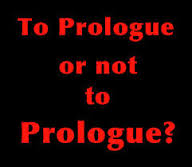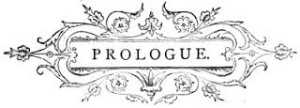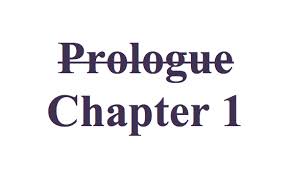 Prologues, is there a secret to a good one or are they just a bad idea? To be fair I’m a fan and all of my completed stories (one is published and two are under contract for later this year) include a prologue. In the further interest of full disclosure, beyond being a native English speaker, I have no qualifications as a writer. No MFA, no BA, not even a single creative writing course to my credit. As a reminder, for those of you either new to this blog, or just too busy (or lazy) to read my bio, I’m an electrical engineer by training – that’s right you can’t spell geek, without ‘EE.’
Prologues, is there a secret to a good one or are they just a bad idea? To be fair I’m a fan and all of my completed stories (one is published and two are under contract for later this year) include a prologue. In the further interest of full disclosure, beyond being a native English speaker, I have no qualifications as a writer. No MFA, no BA, not even a single creative writing course to my credit. As a reminder, for those of you either new to this blog, or just too busy (or lazy) to read my bio, I’m an electrical engineer by training – that’s right you can’t spell geek, without ‘EE.’
 Now that we’ve established my credentials (or lack thereof), why do I use prologues? All of my stories are multi-threaded affairs. They follow many characters with different levels of knowledge from a generally omnipotent reader perspective. Besides personally enjoying that style – it feeds my delusions of importance – I think it engages readers by showing them events from different perspectives.
Now that we’ve established my credentials (or lack thereof), why do I use prologues? All of my stories are multi-threaded affairs. They follow many characters with different levels of knowledge from a generally omnipotent reader perspective. Besides personally enjoying that style – it feeds my delusions of importance – I think it engages readers by showing them events from different perspectives.
It can also lead to a somewhat jarring experience. Some is by design, the mini-cliffhangers that my daughter despises, but some is in the nature of the narrative. I use prologues to mitigate this by providing a little background information or insider knowledge at the beginning of the story. It sets the tone for the reader’s perspective and hopefully introduces a little mystery without overly clogging the story lines. Am I successful? I’d like to think so, but if you’re interested in other examples of using prologues you should look at Stroud’s Bartimaeous trilogy or McDevitt’s Alex Benedict series.
If you’re going to go to the trouble of writing something, much less ask someone to read it, it’s got to have a purpose. All writers regularly violate this rule. That’s why we have editors (conspicuously missing on this blog, I might add). I’ll say that the few editors who’ll admit knowing me, are not fans of prologues. Their advice, if it’s essential to the story, put it in the story. If you must have a prologue, the shorter the better. Maybe it’s precisely because I’ve got no formal training (untainted?) that I find prologues essential.
 The anti-prologue bias seems to permeate the entire publishing world. When I was querying agents and publishers a common request was for the first so many pages or words of my MS. Typically each agency or publisher had their own very specific formats for submission. They made it clear that precisely following their directions was my first test for worthiness of representation or publication. Whether the point of that test was to measure my desperation, willingness to blindly accept direction, or for their own amusement was never made clear. However, being a nerdy ex-military engineer, I spent quite a bit of time matching fonts, fixing spacing, eliminating tabs, and counting words. Regardless of their be-musingly Byzantine requests, one thing was never clear. What to do with my prologue?
The anti-prologue bias seems to permeate the entire publishing world. When I was querying agents and publishers a common request was for the first so many pages or words of my MS. Typically each agency or publisher had their own very specific formats for submission. They made it clear that precisely following their directions was my first test for worthiness of representation or publication. Whether the point of that test was to measure my desperation, willingness to blindly accept direction, or for their own amusement was never made clear. However, being a nerdy ex-military engineer, I spent quite a bit of time matching fonts, fixing spacing, eliminating tabs, and counting words. Regardless of their be-musingly Byzantine requests, one thing was never clear. What to do with my prologue?
What did I do?
In cases where they only wanted a few pages I left it out, if they requested more I included it. A few explicitly expressed their dislike of prologues. I probably shouldn’t have submitted to them. However I knuckled under and either deleted or incorporated my prologue in what amounted to a fairly random decision. Cutting to the chase, none of those submissions panned out. I eventually earned two small house offers. Yet I can’t help but feel that my penchant for prologues lengthened the process.
As always thanks for reading.
Armen


I use them for the very reasons you do, Armen. We’re cut from the same cloth, it seems.
Although, I can bite the norm hard at times so it’s distinctly possible that, in the recesses of my weird mind, I create them for a different purpose… ?
Nahhhhh
Many readers seem to skip prologues. They still read the story, and are happy, they just don’t read prologues. I always read them. I understand they may not be essential to the tale and may not be understandable until you’re deep into the book. For most editors and agents that’s a sure sign that they’re little better than unnecessary baggage. To me discovering that little relevance, no matter how tangential to the plot, is an added bonus. Reading a book is like a train ride; yes the destination is important, but I also take pleasure in the countryside.
From everything I’ve seen, prologues aren’t the “in” thing at the moment. So many things in the industry change due to the preference of what publishers say is correct. Personally, I used them from time to time and haven’t had an issue with them. Most readers tend to not care about the structure, POV, or the many other terms we use as they read for the stories. At least, that’s been my experience so I’d say do what feels right to you.
I debated long and hard with myself, and even asked for guidance from my editor, before including a prologue in my second book. I’m still not sure it was the right decision, even thought it was only two pages long. It’s purpose was to provide a link to the first book in the trilogy. It was actually the epilogue from the first book. I, personally, like them and read them, but so many don’t. The third one won’t have a prologue. Is that the right decision. I still have no idea.
I’m not a fan of prologues most of the time. Prologues are way more important to authors than the readers, which is why agents and publishers don’t like them. Authors might believe they serve a purpose, but that purpose is lost because the prologue become forgettable once the story starts. Readers don’t remember them. That’s makes them pointless from the author’s standpoint. Most authors who use prologues insist the information is important, but if a reader doesn’t remember it, then is it really?
Usually prologues focus on information the author understands but the reader doesn’t. A connection isn’t built toward the reader. It’s a form of info dumping that authors insist is necessary, but only serves to distance the reader. Prologues don’t bring the reader into the story, and for me, most of the time they put me off a story that I will actually like if I can get past the info dumping.
Thanks for taking time to read. Many people share your view of prologues and argue that if they’re so important why not include them in the book, or just call them chapter one. It’s tough to disagree with that point on any objective grounds. I also agree with your point about the prologue being important to writer, perhaps more so than to the reader. I’m not sure that’s a bad thing. Sure I write for my audience, but I also write for myself. I enjoy prologues in books I read, even if they’re chapter 1 by a snooty name, and I’ll probably keep writing them. Not everyone (and apparently very few indeed) is going to read or like my work. Those who do, will at least tolerate a prologue.
Too new to know the in’s & out’s of getting published, I just want to say that I like your common sense approach. Thanks for that.
Like you I always begin with a prologue. It isn’t a random assembly of words I happen to like the sound of, it serves a purpose, introduces either a mc who doesn’t appear until later, or sets out the main theme of the story. I keep them short, they end with a cliff hanger (usually), and I like them. We are always told agents don’t like them, and if I sub to one who is allergic, I just don’t send the prologue. If they are so averse to prologues, they won’t notoice if it’s missing. I’d say write your story, not the agent’s. After all, if they could write they’d be doing it, wouldn’t they?